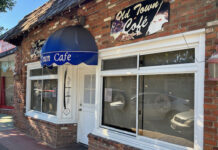Seal Beach planners decided to indefinitely extend the Primrose Café’s alcohol permit at the Wednesday, April 7 Planning Commission meeting.
The vote was 3-0 in favor of extending the Conditional Use Permit to sell beer and wine for consumption at the Primrose.
Commission Chair Ellery Deaton, who represents District 1, had an excused absence from the meeting, according to Director of Development Services Mark Persico. District 2 Commissioner John Larson recused himself from the permit vote because he lives within 300 feet of the café, according to Persico.
The Primrose is located in the Seal Beach Village shopping center. The shopping center is next to Seal Beach Leisure World.
According to the staff report signed by Senior Planner Jerry Olivera, the Primrose Café is located about 325 feet from Leisure World residences.
The shopping center and the retirement community next door are separated by a wall.
“There is no direct access to the shopping center through the perimeter wall at the rear of the shopping center,” Olivera wrote.
The restaurant has been in business since November 1999. The restaurant, which used to be located on the far side of Westminster Avenue, now occupies 2,880 square feet of lease space in the Seal Beach Village.
According to the Olivera report, the business has expanded into an adjacent space. The report said staff wasn’t aware of any problems as a result of the expansion.
However, the expanded area had only been in operation for a couple of months.
Staff recommended the outdoor dining area be closed by 10 p.m. each night.
Staff recommended that the commission approve extending the CUP.
That same night, planners voted 4-0 to approve a minor plan review for the remodel of a 5th Street property.
Owners Chris and Diana Wade wanted to remodel their bathroom and kitchen, add a new bathroom, balcony and trellis to the two-story duplex unit. They also wanted to add a trellis to the front, single-story unit of a non-confirming building. According to the staff report, the building is non-conforming because it exceeds density requirements, does not provide minimum off-street parking and does not meet minimum rear yard setback requirements.
“The property currently consists of two detached structures—a two-story duplex with a two-car garage in the rear of the lot and a single-story single unit at the front of the lot,” said the staff report signed by Olivera.
The report said staff believed the requested changes to the property conformed with the Municipal Code. The report said the changes would provide additional open space, design features and “greater livibility” to the units without increasing square footage.
“As of March 31, 2010, the city has received no comments, written or otherwise, in response to the public hearing notices mailed for MPR 10-6,” Olivera wrote.
Finally, the commission adopted a resolution to allow Surfside Colony residents to apply for height variations. Planners had previously recommended eliminating height variations from the code.
“This was based on the uniqueness of the colony,” said the staff report from Development Director Persico.
Variations allow the construction of architectural features as high as 7.5 feet above the two-story (25-foot) height limit, subject to the approval of the Planning Commission.
Surfside Colony is one of the few areas of Seal Beach that allows three-story homes to be built because the lots are smaller than those found in other parts of the city.
The commission held a public hearing on the subject on March 18. Based on that meeting, planners approved allowing Surfside residents to request height variations for “non-habitable” features only.
The first part of a Planning Commission training session will be held at the Wednesday April 21 meeting.












